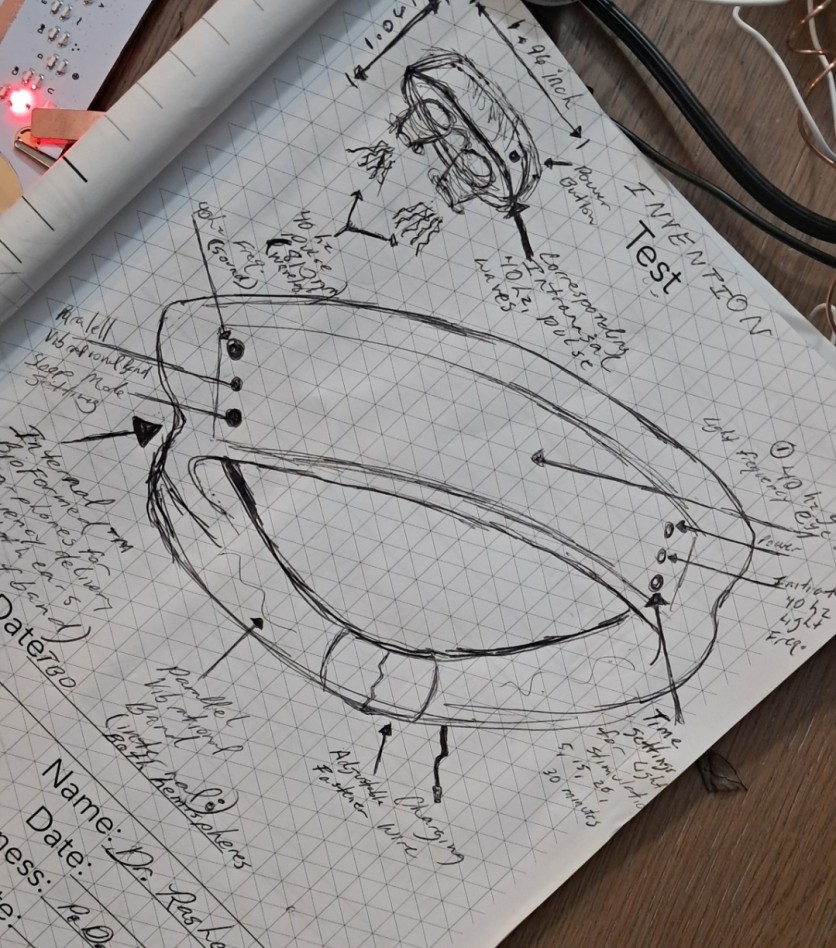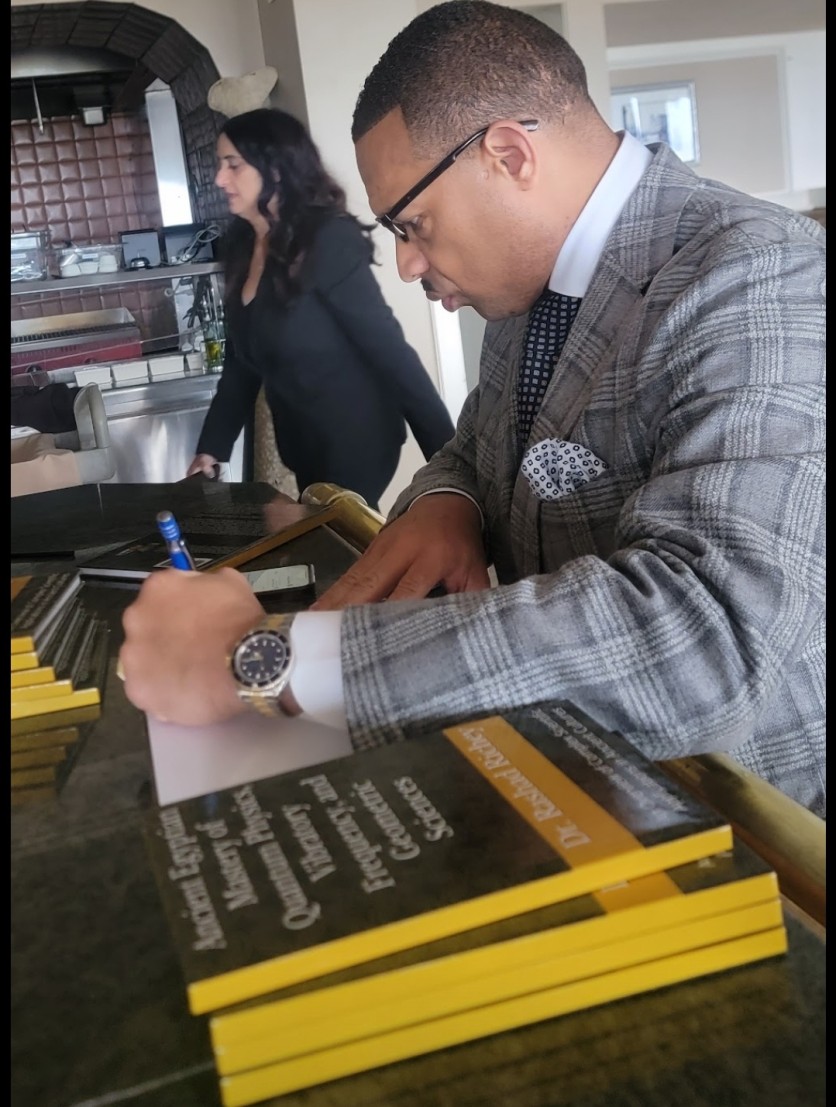
Paris Graduate School Physics Professor, Dr. Rashad Richey, was recently granted provisional patent status by the United States Patent & Trademark Office for his latest invention, the Neurological Brain Entrainment Device, which is turning heads in the medical community as one of the most intriguing scientific advancements in recent years for human cognition.

The device, set to begin clinical trials in 2024, seeks to revolutionize the treatment of Alzheimer's disease, potentially reversing its effects and enhancing cognitive functions. Currently, Alzheimer's has no known medical cure.
During his keynote presentation at the 2023 National Society of Black Physicists Conference in Knoxville, Tennessee—the premier global forum for Black physicists—Dr. Richey articulated his conviction that quantum physics is key to unlocking future medical breakthroughs.
He emphasized the potential of quantum physics to revolutionize our approach to health and disease, underscoring his belief in its capacity to lead to significant advancements in medical research. This perspective highlights his approach to physics and neuroscience, positioning him as an emerging leader in the scientific community and an already established leader in the social sciences arena. Currently enrolled in science graduate studies at Dartmouth College, one of America's eight Ivy League higher education institutions, Dr. Richey holds multiple advanced degrees, including completing doctoral research studies in federal policy reform at Clark Atlanta University, a Doctor of Law in Immigration law from Azteca University, and a Doctor of Jurisprudence (JD) from Renaissance University (RU has an academic partnership with the Law Faculty at the University of Montreal, one of highest ranked law schools internationally). He also earned his Master of Science in Neuroscience at the University of Pacific, Master of Science in Agronomical Physics from the University of Renaissance d'Haiti, and finished his MBA studies at Beulah Heights University. He has peer-reviewed published research in science, policy, and social science fields.
In addition to his studies at Dartmouth, Dr. Richey is also a doctoral research student studying quantum physics at the Paris Graduate School – Innovative Knowledge Institute. PGS is a registered college with the French Ministry of Education, approved by Bureau de Certification International and Qualiopi—a mandatory quality standard accreditation created by the new public institution "France Competencies," harmonizing the practice and quality of training institutions in France. As a private higher education provider, the institution operates under the French Code – Decree of January 25th, 1876, Articles L. 731-2, L. 731-3, and L. 731-4—since June 25, 2013, under receipt No. E-13-09 to offer higher education awards. PGS's academic partners include Accord Ecole de Langues, the University of Liberia, the Global Counter-Terrorism Institute, and the SMS Higher Education Group. A leader in international education, PGS is an institutional member of ACUNS—Academic Council on the United Nations System.
Dr. Richey's interest in human cognition and its complexities is deeply personal. "Watching my grandmother struggle with her memory and awareness was profoundly impactful," Dr. Richey says of a poignant childhood memory. "She was a nurturing soul, and to see her present yet absent was heart-wrenching. The acceptance that nothing could be done to help her was something I could never come to terms with."
This early life experience planted the seeds of curiosity and determination that would later drive his latest scientific endeavor and serve as one of his motivations.
Author of a best-selling physics-genre book titled, "Ancient Egyptian Mastery of Quantum Physics, Vibratory Frequency, and Geometric Sciences: An Overview of Complex Scientific Applications in Ancient Cultures," Dr. Richey traverses multiple arenas, including broadcast and academia. In addition to being on faculty at Paris Graduate School, he also serves as a professor at Morris Brown College in Atlanta, GA, and his lectures have included the University of Michigan, Reinhardt University, Morehouse School of Medicine, and Clark Atlanta University, to name a few. Dr. Richey was honored with the Distinguished Alumni Award from Clark Atlanta University in 2023, and in 2021 was inducted into the extremely exclusive Black College Alumni Hall of Fame, where Dr. Martin Luther King, Jr., Oprah Winfrey, Supreme Court Justice Thrugood Marshall, and Ambassador Andrew Young are all honored past recipients.
About the Groundbreaking Invention
The Neurological Brain Entrainment Device harnesses the principles of brainwave synchronization to reverse the debilitating effects of Alzheimer's disease potentially.
The device, which has received a provisional patent from the United States Patent & Trademark Office, is the culmination of years of interdisciplinary research, blending physics, neuroscience, and quantum mechanics.
Dr. Richey's medically certified, double-blind, and peer-reviewed case study was published in the International Journal of Science and Research, titled "Reversing Alzheimer's: Efficacy of Non-Invasive Quantum Therapies on Human Physiology."
"Our device aims to synchronize brainwave activity through non-invasive stimuli, potentially restoring cognitive functions in Alzheimer's patients," explains Dr. Richey. It emits synchronized light frequency and sound frequency, utilizing 40Hz along with a unique combination of other frequencies. MIT has shown in lab mice that 40Hz frequency may stimulate brain activity and possibly reduce amyloid plaques associated with Alzheimer's. These findings are congruent with Dr. Richey's published research. The device is being engineered by ProtoType House in Florida, and the concept has been supported by various studies. However, Dr. Richey may be the first person to prove the concept in human physiology through a published case study. The device's development was informed by emerging research suggesting gamma frequency entrainment can significantly impact the neural mechanisms underlying memory and learning cortex, illuminating a potential path to duplicatable brain plasticity. The upcoming clinical trials will be crucial in validating the efficacy of this innovative approach.
Understanding the Neurological Brain Entrainment Device
Critics caution that, although the theory is promising, researchers have not yet thoroughly tested the practical application in human subjects. Dr. W. Carhee, the Chief Administrator at West Cascade Medical Center, where the clinical trials will be held, said, "What Dr. Richey is attempting to accomplish intersects so many sciences that having an American physicist, French research scientist, a chiropractor specializing in brain and spinal care, coupled with the medical center's resources and neurosurgeon, simply made sense." Dr. Richey's team also includes an auditory (sound frequency) engineering consultant, who's a former United States Army Major.
Dr. Richey's Quest to Transform Alzheimer's Care
As Dr. Richey prepares for the trials, his plan for the future remains clear and focused. "This is just the beginning. We hope to not only combat Alzheimer's, but also offer a new lease on life to those who believed their diagnosis was a final verdict," he reflects. This blend of optimism and scientific rigor sets Dr. Richey's work apart from his peers.
Dr. Richey's role as an innovator in neuroscience and his invention's potential to revolutionize Alzheimer's disease treatment cannot be overstated. His work reinforces the notion that with the right combination of expertise and determination, the boundaries of medical science can be expanded in ways previously unimaginable.
The implications of Dr. Richey's invention may even extend far beyond Alzheimer's disease. The principles underlying the Neurological Brain Entrainment Device could potentially be adapted to treat various neurological conditions, from Parkinson's disease to traumatic brain injury.
As research progresses and the device's applications broaden, Dr. Richey's contribution to the field could redefine our approach to neurological care, making treatments more effective, less invasive, affordable, and more accessible to those in need.
The Neurological Brain Entrainment Device could prove the power of human ingenuity to confront and overcome the challenges posed by some of the most complex diseases known to man. The world will be watching as the clinical trials unfold, and there's an obvious sense of hope that this could be the dawn of a new breakthrough in the treatment of Alzheimer's and our collective understanding of human brain health.

About Dr. Rashad Richey
Dr. Richey represents a new breed of scientists who are not just researchers but also versatile thinkers pushing the boundaries of what is scientifically possible. A multifaceted scholar and professional, Dr. Richey is also Managing Partner for the Law Office of Richey & Wilson – The Fairness Firm LLP in Washington, D.C., with affiliate practices in Atlanta, GA, Spain, France, and Cape Town, South Africa and serves as President of Rolling Out, the largest free-print urban publication in America. He is a member of the board of directors for Piedmont Atlanta Hospital, Chairman of the Georgia Council for International Visitors (a United States Department of State-funded outfit), and a member in good standing with the National Society of Black Physicists, Delta Theta Phi Law Fraternity, American Association of University Professors, American Bar Association and the International Bar Association.
His recent work in neurophysics and cognition has piqued the scientific community's interest and garnered attention from potential investors and healthcare providers keen on exploring new treatments for an aging global population increasingly affected by Alzheimer's and other cognitive disorders.
![Apple Watch Series 10 [GPS 42mm]](https://d.techtimes.com/en/full/453899/apple-watch-series-10-gps-42mm.jpg?w=184&h=103&f=9fb3c2ea2db928c663d1d2eadbcb3e52)



